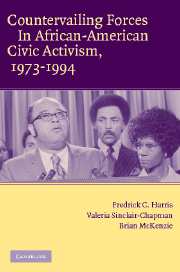Book contents
- Frontmatter
- Contents
- List of Figures and Tables
- Acknowledgments
- 1 Introduction
- 2 Good Times and Bad: Trends in the Economic, Social, and Political Conditions of African Americans in the Post–Civil Rights Era
- 3 Studying Group Activism: Toward a Macro Approach to Black Civic Participation
- 4 Echoes of Black Civic Activism: Historical Foundations and Longitudinal Considerations
- 5 Shifting Forces: Modeling Changes in Post–Civil Rights Black Activism
- 6 From Margin to Center: Bringing Structural Forces into Focus in the Analysis of Black Activism
- Appendix A Question Wording and Coding
- Appendix B Variable Sources and Descriptions
- Appendix C Time Series Models
- References
- Index
4 - Echoes of Black Civic Activism: Historical Foundations and Longitudinal Considerations
Published online by Cambridge University Press: 15 December 2009
- Frontmatter
- Contents
- List of Figures and Tables
- Acknowledgments
- 1 Introduction
- 2 Good Times and Bad: Trends in the Economic, Social, and Political Conditions of African Americans in the Post–Civil Rights Era
- 3 Studying Group Activism: Toward a Macro Approach to Black Civic Participation
- 4 Echoes of Black Civic Activism: Historical Foundations and Longitudinal Considerations
- 5 Shifting Forces: Modeling Changes in Post–Civil Rights Black Activism
- 6 From Margin to Center: Bringing Structural Forces into Focus in the Analysis of Black Activism
- Appendix A Question Wording and Coding
- Appendix B Variable Sources and Descriptions
- Appendix C Time Series Models
- References
- Index
Summary
Time is not a river. Time is a pendulum … intricate patterns of recurrence in history.
Arna BontempsThe history of African-American political struggle has witnessed periods of progression and stagnation. As we documented in the previous chapter, our aggregate-level measures of black civic and political participation have demonstrated volatility during the post–civil rights era. Our analysis of social, economic, and political trends affecting black communities in the post–civil rights era also shows that black communities have experienced political progress as well as social and economic setbacks. Merging social, economic, and political trend data with aggregate-level measurements of black civic activity allows us to test empirically our theory of countervailing forces, which argues that social, economic, and political forces “push-and-pull” black civic participation.
In this chapter, we examine the historical foundations of the push and pull of black civic activism by considering how macro forces influenced black civic life from Reconstruction, the period in which African-American men were bought into the political system in the later part of the nineteenth century, to the dawn of the modern civil rights era, a period that set the stage for black political access and incorporation into mainstream political life in the late twentieth century. This historical analysis provides an illustrative backdrop to the ways in which macro forces have shaped black civic participation over time. As the historical evidence suggests, the push and pull of disfranchisement, industrialization, war, migration, economic depression, and partisan realignments have created both barriers and opportunities for black civic participation.
- Type
- Chapter
- Information
- Publisher: Cambridge University PressPrint publication year: 2005



